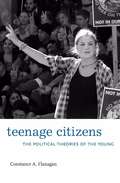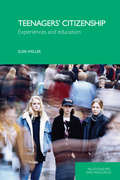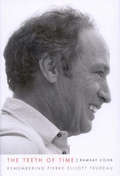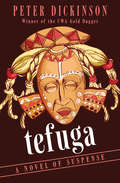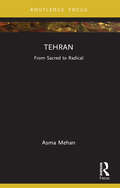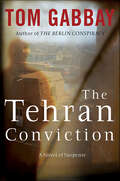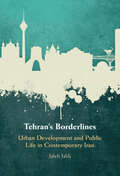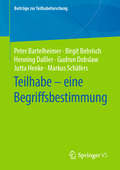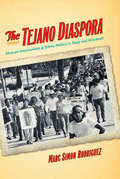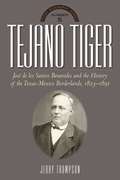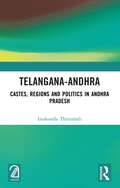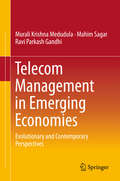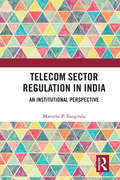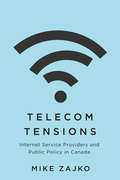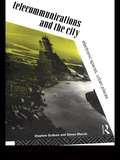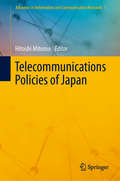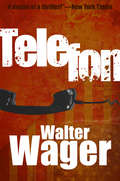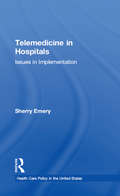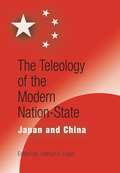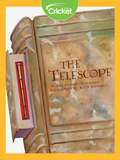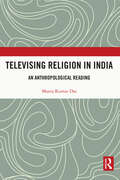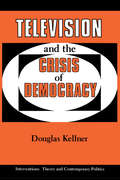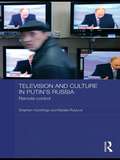- Table View
- List View
Teenage Citizens
by Constance A. FlanaganMost teenagers are too young to vote and are off the radar of political scientists. Teenage Citizens looks beyond the electoral game to consider the question of how this overlooked segment of our citizenry understands political topics. Bridging psychology and political science, Constance Flanagan argues that civic identities form during adolescence and are rooted in teens’ everyday lives-in their experiences as members of schools and community-based organizations and in their exercise of voice, collective action, and responsibility in those settings. This is the phase of life when political ideas are born. Through voices from a wide range of social classes and ethnic backgrounds in the United States and five other countries, we learn how teenagers form ideas about democracy, inequality, laws, ethnic identity, the social contract, and the ties that bind members of a polity together. Flanagan’s twenty-five years of research show how teens’ personal and family values accord with their political views. When their families emphasize social responsibility-for people in need and for the common good-and perform service to the community, teens’ ideas about democracy and the social contract highlight principles of tolerance, social inclusion, and equality. When families discount social responsibility relative to other values, teens’ ideas about democracy focus on their rights as individuals. At a time when opportunities for youth are shrinking, Constance Flanagan helps us understand how young people come to envisage the world of politics and civic engagement, and how their own political identities take form.
Teenagers' Citizenship: Experiences and Education (Relationships and Resources)
by Susie WellerThe introduction of compulsory citizenship education into the national curriculum has generated a plethora of new interests in the politics of childhood and youth. Citizenship for Teenagers explores teenagers’ acts of and engagement with citizenship in their local communities and examines the role of citizenship education in creating future responsible citizens. The first half of the book provides the context for teenagers’ experiences of citizenship, discussing issues around the ideas of childhood and citizenship, as well as the curriculum. The second half goes on to explore teenagers’ experiences of citizenship education, practising citizenship and exclusion from citizenship. The book concludes with a call for a new cumulative approach to citizenship which upgrades the status of teenagers, particularly within the classroom. Susie Weller’s important book will throw new light on how teenagers engage with citizenship education and take on civic responsibility. It is an interesting and useful read for all those involved with education and youth policy as well as those studying for a PGCE or researching in citizenship education.
Teeth of Time
by Ramsay CookTrudeau, the most intellectual of Canadian prime ministers, turned to Cook, an illustrious historian and a speech-writer during the 1968 election campaign, for his trusted views. Cook's revealing memoir also traces how public affairs and the central political themes of Trudeau's reign - nationalism, federalism, and constitutional reform - continued to drive their relationship after Trudeau's resignation in 1984.
Teeth of Time: Remembering Pierre Elliott Trudeau (Footprints Series #5)
by Ramsay CookTrudeau, the most intellectual of Canadian prime ministers, turned to Cook, an illustrious historian and a speech-writer during the 1968 election campaign, for his trusted views. Cook's revealing memoir also traces how public affairs and the central political themes of Trudeau's reign – nationalism, federalism, and constitutional reform – continued to drive their relationship after Trudeau's resignation in 1984.
Tefuga: A Novel of Suspense
by Peter DickinsonIn this evocative tale of suspense from CWA Gold Dagger winner Peter Dickinson, a British diplomat's wife in Nigeria inadvertently precipitates a senseless tragedy, and six decades later, her son becomes caught up in a maelstrom of violent political corruption Filmmaker Nigel Jackland has come to northern Nigeria to work on a new project: a documentary based on the personal diary entries of his mother. Sixty years have passed since Betty Jackland first accompanied her husband, Ted, to this colonial African backwater, resolving to be a perfect helpmate and wife to Britain's district officer in the emirate of Kiti. But Betty's fascination with the local Kitawa tribe, innate sense of justice, and irrepressibly independent spirit mean she could never turn a blind eye to the suffering of oppressed women--particularly the abused wives of the ruling emir. She never imagined that her strong words and actions could have violent consequences in the shadow of Tefuga Hill--or that the echoes of the tragedy would resound dangerously in the life of her own son many years on. Linking two stories separated by more than half a century and relating them in alternating chapters, Tefuga is an enthralling, evocative, and suspenseful tale of corruption, imperialism, race, and murder. A master of both style and substance, Dickinson brilliantly re-creates times and places in stunning detail, transporting readers to an Africa so remarkably realistic they can almost feel the equatorial winds on their faces.
Tehran: From Sacred to Radical (Built Environment City Studies)
by Asma MehanThis book is an interdisciplinary research work designed to be of interest to a broad range of academics. The book examines the relationship between democracy and the (trans)formations of urban spaces through comparative perspective. It engages with the ideas of ‘modernity’ in architecture and investigates how they might align (or not) with other forms of radical power. This book offers an understanding of the public spaces through political change, power struggle, and autocratic modernity manifested. It addresses the subject of politics in architecture and built environment by examining the various academic literature in urban studies, architectural history, urban anthropology, urban sociology, cultural geographies, planning history, philosophy, and the broader social and political sciences. Followingly, it will be focused on the less well-known traditions of architecture and democratic values drawing upon western and (non)western perspectives to decolonize the notion of public space in the global south. In better words, the book investigates the mechanisms of power struggles and the transformative dynamism of totalization and state-led modernization, which motivates or shapes a creative tension in the form of the city. The topic of the work is novel and aims to examine the relationship between the affordances of public spaces, their micro-histories, and the emergence of critical social events and movements. The breadth of the topic demanded engagement with a rich body of architectural theory and history and relevant texts in urban sociology, colonial and postcolonial studies, political geography, and cultural studies, a challenge to which the book has responded outstandingly. The issue is urgent for policymakers and architects, urban designers, political and cultural geographers, and other practitioners working on the built environment to create more democratic public spaces in the global south.
The Tehran Conviction: A Novel of Suspense
by Tom Gabbay“Told against the background of a real-life CIA coup, The Tehran Conviction mixes historical fact with vivid storytelling in ways that will delight readers of both.”—Stephen Kinzer, New York Times Bestselling author of All the Shah’s MenBestselling thriller writer Jack Higgins calls Tom Gabbay, “John le Carré with a witty ironic edge.” In The Tehran Conviction, the acclaimed author of The Berlin Conspiracy and The Lisbon Crossing sends Agent Jack Teller to Iran during two equally volatile times in the nation’s recent history: on the eve of a CIA-sponsored coup in1953, and in 1979, the year of the infamous Islamic revolution. Denver’s Rocky Mountain News advises you to, “add [Gabbay’s] name to the must-read list of thriller writers.” Read The Tehran Conviction and see why.
Tehran's Borderlines: Urban Development and Public Life in Contemporary Iran
by Jaleh JaliliTehran has changed in recent decades. Rapid urban development through the expansion of subway lines, highways, bridges, and tunnels, and the emergence of new public spaces have drastically reshaped the physical spaces of Tehran. As the city changes, so do its citizens, their social relations, and their individual and collective perceptions of urban life, class, and culture. Tehran's Borderlines is about the social relations that are interrupted, facilitated, forged, and transformed through processes of urban development. Focusing on the use of public spaces, this book provides an analysis of urban social relations in the context of broader economic, cultural, and political forces. The book offers a narrative of how public spaces function as manifestations of complex relations among citizens of different backgrounds, between citizens and the state, and between forces that shape the physical realities of spaces and the conceptual meanings that citizens create and assign to them.
Teilhabe – eine Begriffsbestimmung (Beiträge zur Teilhabeforschung)
by Peter Bartelheimer Birgit Behrisch Henning Daßler Gudrun Dobslaw Jutta Henke Markus SchäfersDas Buch soll zu einem klareren Begriffsverständnis von Teilhabe und damit zur theoretischen Verortung und Reflexion von Teilhabeforschung beitragen. Eine Begriffsklärung ist nicht nur in Bezug auf die Kommunikation über Teilhabe in Arbeitszusammenhängen des Bündnisses relevant, sondern auch aus der Verbreitung des Teilhabebegriffs. Mit einem über die Politik- und Arbeitsfelder hinweg geteilten Bedeutungskern wird er insbesondere auch für das Verständnis und die Bearbeitung derjenigen sozialen Probleme interessant, die Bereichsgrenzen und klare leistungsrechtliche Zuordnungen überschreiten bzw. sich an deren Schnittstellen bewegen. Intersektionelle Benachteiligungen lassen sich gut als Häufungen und Zuspitzungen von Teilhabeeinschränkungen beschreiben.
The Tejano Diaspora
by Marc Simon RodriguezEach spring during the 1960s and 1970s, a quarter million farm workers left Texas to travel across the nation, from the Midwest to California, to harvest America's agricultural products. During this migration of people, labor, and ideas, Tejanos established settlements in nearly all the places they traveled to for work, influencing concepts of Mexican Americanism in Texas, California, Wisconsin, Michigan, and elsewhere. InThe Tejano Diaspora, Marc Simon Rodriguez examines how Chicano political and social movements developed at both ends of the migratory labor network that flowed between Crystal City, Texas, and Wisconsin during this period. Rodriguez argues that translocal Mexican American activism gained ground as young people, activists, and politicians united across the migrant stream. Crystal City, well known as a flash point of 1960s-era Mexican Americanism, was a classic migrant sending community, with over 80 percent of the population migrating each year in pursuit of farm work. Wisconsin, which had a long tradition of progressive labor politics, provided a testing ground for activism and ideas for young movement leaders. By providing a view of the Chicano movement beyond the Southwest, Rodriguez reveals an emergent ethnic identity, discovers an overlooked youth movement, and interrogates the meanings of American citizenship.
Tejano Tiger: Jose de los Santos Benavides and the Texas-Mexico Borderlands, 1823-1891 (The Texas Biography Series #5)
by Jerry ThompsonIt was under the Confederacy in the disputed Texas-Mexico borderlands that Santos Benavides reached the pinnacle of his military career as the highest-ranking Tejano in the entire Confederate army. In the decades that followed the Civil War, he became an esteemed political leader, highly respected on both sides of the border. This is the first scholarly study of this important historical figure.
Telangana-Andhra: Castes, Regions and Politics in Andhra Pradesh
by Inukonda ThirumaliThis book is an attempt to present the inside story of the Telangana movement that developed due to historical reasons. The movement, in this work, has brought forward the Telangana lower class’s response to the established cultural hegemony of the Andhra linguistic elite and affluent agrarian communities who, in their perception, monopolized the political power and economic resources. The movement voices the democratic yearnings of service castes, artisans, Dalits and nomads who through their instant association with the movement expressed aspirations for their due share in political power and administrative structure. The leadership that has come from the regional elite has, however, articulated only the reasons of 'self-respect and regional autonomy'. This work brings out the two-fold character in the movement. It also gives insights into the possible need of remaking states in India in the interest of the inclusion of these social groups in political structures so that democracy might further percolate downwards. This book is co-published with Aakar Books. Print edition not for sale in South Asia (India, Sri Lanka, Nepal, Bangladesh, Pakistan and Bhutan)
Telecom Management in Emerging Economies
by Murali Krishna Medudula Mahim Sagar Ravi Parkash GandhiThis book discusses the ideas, interventions (by different players) and technological revolutions that have transformed the telecom industry to propel it towards a growth cycle. Pursuing a comprehensive approach, it examines highly topical issues in depth, e. g. mobile data security via 4G, the new industrial revolution, green telecommunications, and consumer awareness of radio signals. Along with input from regulators, government organizations and industry players, expert opinion columns in each chapter clearly present the viewpoints of the industry and ministry. Several graphical tools are used throughout the book, helping readers to contemplate the text in different ways and to make concepts more "hands-on. " Readers will also gain a holistic perspective of the industry (key players, regulatory bodies and the consumer) and a clearer understanding of various policy issues and their implementation mechanisms, business dynamics and technology issues in this sector.
Telecom Sector Regulation in India: An Institutional Perspective
by Maruthi P. TangiralaThis book traces important legal and regulatory developments in the first two decades since the Telecom Regulatory Authority of India (TRAI) was established, along with its political and economic aspects. It narrates the story of the institutional progress of TRAI and its influence on the growth of India’s telecom sector. The telecom revolution was a game changer in post-liberalization India, a country today home to the second largest subscriber base in the world– more people have access to mobile phones than toilets. Its rapid, relentless growth has created new possibilities and challenges, including a robust regulatory policy. This book, the first comprehensive survey of TRAI’s progress, examines the salient developments in regulation of the Indian telecom sector. It analyses, at the macro-institutional level, the norms and rules reconstituted over time; at the institutional level, the impact of important court judgments, relevant telecom case law (including the 2G judgment and Adjusted Gross Revenue-related cases), and the ‘judicialization’ of regulatory governance; and, at the micro-institutional level, the mechanisms of governance of TRAI and the way its functioning has affected the alignment of incentives in the regulatory space. It provides an overview of the regulatory framework and the context in which the telecom sector was deregulated, the structure of internal governance, and issues in telecom licensing and spectrum allotment. The book combines academic rigour and empirical research with a practitioner’s perspective of the unfolding events. It will interest students and researchers of economics, law, public policy, communications technology, and ICT policy and regulation, as well as telecom sector professionals, service providers, academic experts, policymakers, and think tanks.
Telecom Tensions: Internet Service Providers and Public Policy in Canada
by Mike ZajkoToday's internet service providers mediate communication, control data flow, and influence everyday online interactions. In other words, they have become ideal agents of public policy and instruments of governance. In Telecom Tensions Mike Zajko considers the tensions inherent to this role – between private profits and the public good, competition and cooperation, neutrality and discrimination, surveillance and security – and asks what consequences arise from them.Many understand the internet as a technology that cuts out traditional gatekeepers, but as the importance of internet access has grown, the intermediaries connecting us to it have come to play an increasingly vital role in our lives. Zajko shows how the individuals and organizations that keep these networks running must satisfy a growing number of public policy objectives and contradictory expectations. Analyzing conflicts in Canadian policy since the commercialization of the internet in the 1990s, this book unearths the roots of contemporary debates by foregrounding the central role of internet service providers. From downtown data centres to publicly funded rural networks, Telecom Tensions explores the material infrastructure, power relations, and political aspirations at play.Theoretically informed but grounded in the material realities of people and places, Telecom Tensions is a fresh look at the political economy of telecommunications in Canada, updating conversations about liberalization and public access with contemporary debates over privacy, copyright, network neutrality, and cyber security.
Telecommunications and the City: Electronic Spaces, Urban Places
by Steve Graham Simon MarvinTelecommunications and the City provides the first critical and state-of-the-art review of the relations between telecommunications and all aspects of city development and management.Drawing on a range of theoretical approaches and a wide body of recent research, the book addresses key academic and policy debates about technological change and the future of cities with a fresh perspective. Through this approach, the complex and crucial transformations underway in cities in which telecommunications have central importance are mapped out and illustrated. Key areas where telecommunications impinge on the economic, social, physical, enviromental and institutional development of cities are illustrated by using boxed extracts and wide range of case study examples from Europe, Japan and North America.Rejecting the extremes of optimism and pessimism in current hype about cities and telecommunications, Telecommunications and the City offers a sophisticated new perspective through which city-telecommunications relations can be understood.
Telecommunications Policies of Japan (Advances in Information and Communication Research #1)
by Hitoshi MitomoThis book provides a detailed description of Japan’s telecommunications policies. It discusses how Japan has addressed a variety of policy challenges ranging from traditional regulatory issues, such as the provision of a universal service, to the latest tasks, including the promotion of cutting-edge technologies. Japan is a global leader in information and communication technologies (ICT). In addition to technological advances, an impressive nationwide optical-fiber and advanced mobile network infrastructure has been developed, which has boosted the economy and benefited society. The Ministry of Internal Affairs and Communications (MIC) has played an important role in ICT deployment. Japan has a unique ICT policy framework that does not separate regulation and promotion, unlike many other countries, which have an independent regulator. However, since relatively little information has been provided in English, it has been difficult to learn much about Japan’s policies. Written by specialists from MIC, industry and academia, this is the first collaborative work to provide a comprehensive discussion of Japan’s ICT policies, allowing readers to gain an understanding of the topic.
Telefon
by Walter WagerAn edgy Cold War thriller, perfect for fans of The Manchurian Candidate and other terrifying conspiracy novels. The Russians called the project TELEFON. Collect 430 first-class English speakers who’d never left the country. Drill them in every detail of American life and then hand-pick the top students for drug-assisted hypnosis. Every one of them believes he is the American whose papers he carried, and every one of them has been programmed to destroy a target in the United States. The trigger is a coded phone message. It was a brilliant plan. But now, at the wrong time, it was being executed by the wrong man and the Russians must stop TELEFON by dispatching their own special agents to the United States. This “doozy of a thriller,” which was made into a classic film starring Charles Bronson, is now available in eBook format for the first time (TheNew York Times).
The Telegraph India [Mon, 27 Nov 2017]
by R. RajgopalArticles in this issue: Home India Calcutta World Opinion Business Sports West Bengal North East Jharkhand Bihar Odisha Entertainment Lifestyle Science Technology Travel Health Auto
Telemedicine in Hospitals: Issues in Implementation (Health Care Policy in the United States)
by Sherry EmeryFirst Published in 1942. Routledge is an imprint of Taylor & Francis, an informa company.
The Teleology of the Modern Nation-State: Japan and China (Encounters with Asia)
by Joshua A. FogelJapan and China did not begin to emerge as unified political entities until the nineteenth century. Yet scholars and politicians persistently refer to "Japan" and "China" in discussions of earlier periods, as if the modern nation-state had long been established in these regions. Joshua Fogel here brings together essays by eight renowned East Asian scholars to demonstrate why this oversight distorts our historical analysis and understanding of both countries. The nation-states of Japan and China developed much later and, indeed, far less uniformly than usually conveyed in popular myth and political culture. Moreover, the false depiction of an earlier national identity not only alters the factual record; it serves the contemporary engines of nationalist mythology and propaganda.This interdisciplinary volume asks deceptively simple questions: When did "Japan" and "China" become Japan and China? When and why do inhabitants begin to define their identity and interests nationally rather than locally? Identifying the role of mitigating factors from disease and travel abroad to the subtleties of political language and aesthetic sensibility, the answers provided in these diverse and insightful essays are appropriately complex. By setting aside Western notions of the nation-state, the contributors approach each region on its own terms, while the thematic organization of the book provides a unique lens through which to view the challenges common to understanding both Japan and China. This highly readable collection will be important to scholars both inside and beyond the field of East Asian studies.
The Telescope
by Lisa Harries SchumannKing Fensgar spends the long winter days wandering his castle and imagining that everyone else in the kingdom is as bored as he is. A special book helps him realize he doesn't have the slightest idea of what is happening in his own kingdom.
Televising Religion in India: An Anthropological Reading
by Manoj Kumar DasThis book explores how religion manifests itself in television and popular media. It focuses on how religious tradition, practices and discourses have been incorporated into non-religious television programmes and how they bring both the community and the media into the fold of religion. The volume traces the cultural and institutional history of television in the state of Sikkim, India to investigate how it became part of cultural life of communities. The author has analysed three televised shows which captured the imagination of communities and became a ceremonial and religious practice. Through these case studies, he highlights how rituals and myths function in mass media, how traditional institutions and religious practices redefine themselves through their association with the visual mass medium, and how identities based on religion, cultural tradition and politics are reinforced, transformed and amplified through television. The book further analyses the engagement of televised religion with audiences, its reach, relevance and contents and its relationship with urbanity, tradition, and identity. This volume will be of interest to students and researchers of media studies, culture studies, religious studies, media and communications, sociology, cultural anthropology, and history.
Television And The Crisis Of Democracy
by Douglas KellnerDouglas Kellner offers a systematic, critically informed political and institutional study of television in the United States. Focusing on the relationship among television, the state, and business, he traces the history of television broadcasting, emphasizing its socioeconomic impact and its growing political power. Acknowledging that television has long served the interests of the powerful, he points out that it has dramatized conflicts within society and has on occasion led to valuable social criticism.Kellner's examination of television in the 1980s and, in particular, its role in the 1988 presidential election yields the conclusion that in our time television has worked increasingly to further conservative hegemony. In so doing, Kellner argues, contemporary television has helped produce a crisis of democracy.But Television and the Crisis of Democracy goes beyond description and diagnosis. In a discussion that is both analytical and comparative, Kellner presents alternative models to the existing structure of commercial broadcasting and shows how new technologies might be used to create a more democratic future for television,one that could enhance political knowledge and participation.
Television and Culture in Putin's Russia: Remote control (BASEES/Routledge Series on Russian and East European Studies)
by Stephen Hutchings Natalia RulyovaThis book examines television culture in Russia under the government of Vladimir Putin. In recent years, the growing influx into Russian television of globally mediated genres and formats has coincided with a decline in media freedom and a ratcheting up of government control over the content style of television programmes. All three national channels (First, Russia, NTV) have fallen victim to Putin’s power-obsessed regime. Journalists critical of his Chechnya policy have been subject to harassment and arrest; programmes courting political controversy, such as Savik Shuster’s Freedom of Speech (Svoboda slova) have been taken off the air; coverage of national holidays like Victory Day has witnessed a return of Soviet-style bombast; and reporting on crises, such as the Beslan tragedy, is severely curtailed. The book demonstrates how broadcasters have been enlisted in support of a transparent effort to install a latter-day version of imperial pride in Russian military achievements at the centre of a national identity project over which, from the depths of the Kremlin, Putin’s government exerts a form of remote control. However, central to the book's argument is the notion that because of the changes wrought upon Russian society after 1985, a blanket return to the totalitarianism of the Soviet media has, notwithstanding the tenor of much western reporting on the issue, not occurred. Despite the fact that television is nominally under state control, that control remains remote and less than wholly effective, as amply demonstrated in the audience research conducted for the book, and in analysis of contradictions at the textual level. Overall, this book provides a fascinating account of the role of television under President Putin, and will be of interest to all those wishing to understand contemporary Russian society.
